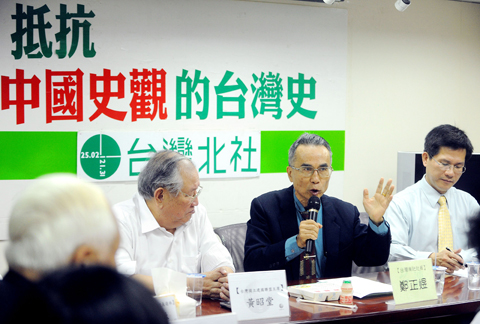After months of meetings, a Ministry of Education (MOE) task force charged with revising high school curriculums is coming close to approving a version that will increase emphasis on Chinese history over world history, education activists said yesterday.
Groups protesting the revision said they feared the move could have a spillover effect onto other historical issues including changes on how the 228 Incident and the Kaohsiung Incident are portrayed in relation to the development of Taiwan’s democracy.
At present, high school students are required to take one semester each of Taiwanese and Chinese history and another two of world history. The revisions, if passed, would mean that students would first take one semester of Taiwanese history and then one-and-a-half semesters in Chinese and world history.

PHOTO: WANG YI-SUNG, TAIPEI TIMES
However, Chen Yi-shen (陳儀深), president of the Taiwan Association of University Professors, said yesterday he feared members of the task force could further increase the emphasis on Chinese history during its next meeting on Saturday.
According to committee members, National Taiwan University philosophy professor Wang Hsiao-po (王曉波) has proposed that students spend up to two semesters studying Chinese history.
“Our concerns that these changes will have a negative effect on students have fallen on deaf ears,” Chen said. “The MOE says it will respect expert opinion from the task force, but the truth is that members are not free of bias.”
“A string of changes by the MOE now mean that there are more pan-blue academics advocating Chinese ideas on the task force,” Chen said.
A statement released yesterday by pro-independence organizations and signed by groups representing teachers and professors said the problem of political bias on the task force was becoming so serious that they were asking Democratic Progressive Party (DPP) Chairperson Tsai Ing-wen (蔡英文) to become personally involved in the matter and pressure the MOE to reject the proposed changes.
“The kind of history education they are proposing … is deeply flawed. While the proposed economic cooperation framework agreement [ECFA] will unify China and Taiwan economically, the new [education] revisions are a political tactic designed for political unification,” the statement said.
National Chengchi University history professor Hsueh Hua-yuan (薛化元) said there was concern within the education community regarding the content of the revisions and not just changes in course timetables.
Earlier this month, activists led by DPP lawmakers met Education Minister Wu Ching-chi (吳清基), who said that changes were still under consideration and that final decisions by the task force would be subject to public hearings.
However, Hsueh said yesterday that: “The committee members have already reached a consensus to raise the emphasis of Chinese history over world history.”
Negotiations over the revisions are expected to be completed by the end of next month, Hsueh said, adding that it remained to be seen whether textbook publishers would have enough time to incorporate the changes into the 2011-2012 school year curriculum.

Alain Robert, known as the "French Spider-Man," praised Alex Honnold as exceptionally well-prepared after the US climber completed a free solo ascent of Taipei 101 yesterday. Robert said Honnold's ascent of the 508m-tall skyscraper in just more than one-and-a-half hours without using safety ropes or equipment was a remarkable achievement. "This is my life," he said in an interview conducted in French, adding that he liked the feeling of being "on the edge of danger." The 63-year-old Frenchman climbed Taipei 101 using ropes in December 2004, taking about four hours to reach the top. On a one-to-10 scale of difficulty, Robert said Taipei 101

Nipah virus infection is to be officially listed as a category 5 notifiable infectious disease in Taiwan in March, while clinical treatment guidelines are being formulated, the Centers for Disease Control (CDC) said yesterday. With Nipah infections being reported in other countries and considering its relatively high fatality rate, the centers on Jan. 16 announced that it would be listed as a notifiable infectious disease to bolster the nation’s systematic early warning system and increase public awareness, the CDC said. Bangladesh reported four fatal cases last year in separate districts, with three linked to raw date palm sap consumption, CDC Epidemic Intelligence

US climber Alex Honnold left Taiwan this morning a day after completing a free-solo ascent of Taipei 101, a feat that drew cheers from onlookers and gained widespread international attention. Honnold yesterday scaled the 101-story skyscraper without a rope or safety harness. The climb — the highest urban free-solo ascent ever attempted — took just more than 90 minutes and was streamed live on Netflix. It was covered by major international news outlets including CNN, the New York Times, the Guardian and the Wall Street Journal. As Honnold prepared to leave Taiwan today, he attracted a crowd when he and his wife, Sanni,

Taiwanese and US defense groups are collaborating to introduce deployable, semi-autonomous manufacturing systems for drones and components in a boost to the nation’s supply chain resilience. Taiwan’s G-Tech Optroelectronics Corp subsidiary GTOC and the US’ Aerkomm Inc on Friday announced an agreement with fellow US-based Firestorm Lab to adopt the latter’s xCell, a technology featuring 3D printers fitted in 6.1m container units. The systems enable aerial platforms and parts to be produced in high volumes from dispersed nodes capable of rapid redeployment, to minimize the risk of enemy strikes and to meet field requirements, they said. Firestorm chief technology officer Ian Muceus said